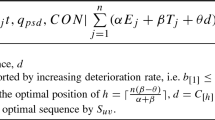Abstract
This paper investigates the single-machine multiple common due dates assignment and scheduling problems in which the processing time of a job depends on its position in a job sequence and its resource allocation. We examine the general position-dependent deterioration effect and two models of resource allocation. The objective function is to minimize a total penalty function containing earliness, tardiness, due date, and resource consumption costs. We introduce two polynomial time algorithms to solve the considered problems. Since the two algorithms solve the problems in polynomial time, they can solve large-scale instances of the problem under study in little time.
Similar content being viewed by others
References
Biskup D (2008) A state-of-the-art review on scheduling with learning effects. Eur J Oper Res 188:315–329
Biskup D, Jahnke H (2001) Common due date assignment for scheduling on a single machine with jointly reducible processing times. Int J Prod Econ 69:317–322
Chand S, Chhajed D (1992) A single machine model for determination of optimal due dates and sequence. Oper Res 40:596–602
Chang P-C, Chen S-H, Mani V (2009) A note on due-date assignment and single machine scheduling with a learning/aging effect. Int J Prod Econ 117:142–149
Cheng TCE, Oguz C, Qi XD (1996) Due-date assignment and single machine scheduling with compressible processing times. Int J Prod Econ 43:29–35
Cheng TCE, Kang L, Ng CT (2004) Due-date assignment and single machine scheduling with deteriorating jobs. J Oper Res Soc 55:198–203
Chudzik K, Janiak A, Lichtenstein M (2006) Scheduling problems with resource allocation. In: Janiak A (ed) Scheduling in computer and manufacturing systems. WKL, Warszawa, pp 39–67
Dickman B, Wilamowsky Y, Epstein S (2001) Multiple common due dates. Nav Res Logist 48:293–298
Gawiejnowicz S (2008) Time-dependent scheduling. Springer, New York
Graham RL, Lawler EL, Lenstra JK, Rinnooy Kan AHG (1979) Optimization and approximation in deterministic sequencing and scheduling: a survey. Ann Disc Math 5:287–326
Hardy GH, Littlewood JE, Polya G (1967) Inequalities. Cambridge University Press, London
Janiak A (1989) Minimization of the blooming mill standstills-mathematical model, suboptimal algorithms. Mechanika 8(2):37–49
Janiak A, Rudek R (2006) Scheduling problems with position dependent job processing times. In: Janiak A (ed) Scheduling in computer and manufacturing systems. WKL, Warszawa, pp 26–38
Janiak A, Rudek R (2009) Experience based approach to scheduling problems with the learning effect. IEEE Trans Syst Man Cybern Part A 39:344–357
Ji M, Cheng TCE (2008) Parallel-machine scheduling with simple linear deterioration to minimize total completion time. Eur J Oper Res 188:342–347
Kaspi M, Shabtay D (2003) Optimization of machining economics problem for a multi-stage transfer machine under failure, opportunistic and integrated replacement strategies. Int J Prod Res 41:2229–2248
Kayan RK, Akturk MS (2005) A new bounding mechanism for the CNC machine scheduling problem with controllable processing times. Eur J Oper Res 167:624–643
Kuo W-H, Yang D-L (2008) A note on due-date assignment and single-machine scheduling with deteriorating jobs. J Oper Res Soc 59:857–859
Lee H-T, Yang S-J (2012) Parallel machines scheduling with deterioration effects and resource allocations. J Chin Inst Ind Eng. doi:10.1080/10170669.2012.737374
Monma CL, Schrijver A, Todd MJ, Wei VK (1990) Convex resource allocation problems on directed acyclic graphs: duality, complexity, special cases and extensions. Math Oper Res 15:736–748
Ng CTD, Cheng TCE, Kovalyov MY, Lam SS (2003) Single machine scheduling with a variable common due date and resource-dependent processing times. Comput Oper Res 30:1173–1185
Nowicki E, Zdrzalka S (1990) A survey of results for sequencing problems with controllable processing times. Discret Appl Math 26:271–287
Panwalkar SS, Smith ML, Seidmann A (1982) Common due date assignment to minimize total penalty for the one machine scheduling problem. Oper Res 30:391–399
Rudek R (2012) Some single-machine scheduling problems with the extended sum-of-processing-time-based aging effect. Int J Adv Manuf Technol 59:299–309
Shabtay D, Steiner G (2007) A survey of scheduling with controllable processing times. Discret Appl Math 155:1643–1666
Shabtay D, Steiner G (2008) The single-machine earliness-tardiness scheduling problem with due date assignment and resource-dependent processing times. Ann Oper Res 159:25–40
Trick M (1994) Scheduling multiple variable-speed machines. Oper Res 42:234–248
Vickson RG (1980) Choosing the job sequence and processing times to minimize processing plus flow cost on a single machine. Oper Res 28:1155–1167
Wang D, Wang J-B (2010) Single-machine scheduling with simple linear deterioration to minimize earliness penalties. Int J Adv Manuf Technol 46:285–290
Wang J-B (2006) Single machine scheduling with common due date and controllable processing times. Appl Math Comput 174:1245–1254
Wang J-B (2006) Single machine common flow allowance scheduling with controllable processing times. J Appl Math Comput 21:249–257
Wang J-B (2007) Single-machine scheduling problems with the effects of learning and deterioration. Omega 35:397–402
Wang J-B (2010) Flow shop scheduling with deteriorating jobs under dominating machines to minimize makespan. Int J Adv Manuf Technol 48:719–723
Wang J-B, Wang L-Y, Wang D, Wang X-Y (2009) Single-machine scheduling with a time-dependent deterioration. Int J Adv Manuf Technol 43:805–809
Wang J-B, Wang M-Z (2010) Single machine multiple common due dates scheduling with learning effects. Comput Math Appl 60:2998–3002
Wu C-C, Shiau Y-R, Lee L-H, Lee W-C (2009) Scheduling deteriorating jobs to minimize the makespan on a single machine. Int J Adv Manuf Technol 40:1230–1236
Yin Y, Liu M, Hao J, Zhou M (2012) Single-Machine scheduling with job-position-dependent learning and time-dependent deterioration. IEEE Trans Syst Man Cybern Part A 42:192–200
Yin Y, Xu D, Sun K, Li H (2009) Some scheduling problems with general position-dependent and time-dependent learning effects. Inf Sci 179:2416–2425
Yin Y, Xu D, Wang J-B (2010) Single-machine scheduling with a general sum-of-actual-processing-times-based and job-position-based learning effect. Appl Math Model 34:3623–3630
Author information
Authors and Affiliations
Corresponding author
Rights and permissions
About this article
Cite this article
Yang, SJ., Lee, HT. & Guo, JY. Multiple common due dates assignment and scheduling problems with resource allocation and general position-dependent deterioration effect. Int J Adv Manuf Technol 67, 181–188 (2013). https://doi.org/10.1007/s00170-013-4763-x
Received:
Accepted:
Published:
Issue Date:
DOI: https://doi.org/10.1007/s00170-013-4763-x



